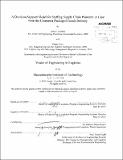A decision support model for staffing supply chain planners : a case from the consumer packaged goods industry
Author(s)
Castillo, Aura C. (Aura Carolina); Ucev, Ethem
DownloadFull printable version (7.751Mb)
Other Contributors
Massachusetts Institute of Technology. Engineering Systems Division.
Advisor
Roberto Perez-Franco.
Terms of use
Metadata
Show full item recordAbstract
Reducing or increasing labor force is not always effective when done without a thorough analysis. Organizations could face negative consequences such us unbalanced workload, inefficient procedures, lost sales, and negative work atmosphere. An increasing number of organizations are centralizing operations in order to optimize labor costs. However, not all companies assess the new number of employees required after centralization takes place, and for those companies that actually do this analysis, there are not quantitative tools, as far as we know in the literature, that can help them estimate the workforce required. This thesis project provides practitioners with a new mathematical model to estimate an appropriate number of production planners required for the supply chain planning department of a company in the consumer packaged goods industry. Using bivariate correlation and multiple regression analysis, we explored whether a relationship exists between the required number of production planners in the new centralized offices of the Company and 13 factors that impact employee's workload. The resulting regression model accounts for 98% of the variance of the number of planners.
Description
Thesis (M. Eng. in Logistics)--Massachusetts Institute of Technology, Engineering Systems Division, 2013. Cataloged from PDF version of thesis. Includes bibliographical references (p. 55-56).
Date issued
2013Department
Massachusetts Institute of Technology. Engineering Systems DivisionPublisher
Massachusetts Institute of Technology
Keywords
Engineering Systems Division.